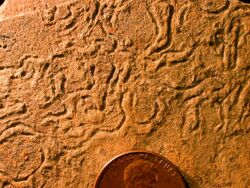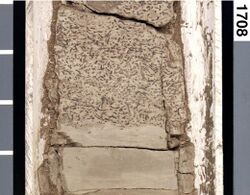Biology:Helminthopsis


Helminthopsis is the ichnogenus of a type of trace fossil that is found preserved on the bedding planes of fine-grained sedimentary rocks. It is characterized by short, curvilinear, non-branching, parallel-sided, unlined traces on bedding surfaces. It is thought to represent the submarine feeding trails of an invertebrate organism that worked the surface of muddy substrates in search of food.[1][2] Because Helminthopsis traces never cross over themselves, the ichnogenus is distinguished from similar traces assigned to the Gordia ichnogenus.[3] The similar sounding, but now obsolete, ichnogenus Helminthoida refers to a somewhat similar trace characterized by regular, back-and-forth meanders, whereas Helminthopsis traces are irregular.[4]
See also
References
- ↑ Fillion, D.; Pickerall, R.K. (1990). "Ichnology of the Upper Cambrian? to Lower Ordovician Bell Island and Waban groups of eastern Newfoundland, Canada". Palaeontographica Canadian 7: 1–41.
- ↑ Buatois, L.A., Mángano, M.G., Maples, C.G. and Lanier, W.P. (1998). "Ichnology of an Upper Carboniferous fluvio-estuarine paleovalley: The Tonganoxie sandstone, Buildes Quarry, eastern Kansas, USA". Journal of Paleontology 72: 152–180.
- ↑ Wang, Y.; Lin, J. P.; Zhao, Y. L.; Orr, P. J. (2009). "Palaeoecology of the trace fossil Gordia and its interaction with nonmineralizing taxa from the early Middle Cambrian Kaili Biota, Guizhou Province, South China". Palaeogeography, Palaeoclimatology, Palaeoecology 277: 141–148. doi:10.1016/j.palaeo.2009.02.017.
- ↑ Carmona, N.B., Buatois, L.A., Mángano, M.A. and Bromley, R.G. (2008). "Ichnology of the Lower Miocene Chenque Formation, Patagonia, Argentina: animal - substrate interactions and the Modern Evolutionary Fauna". Ameghiniana 45 (1). http://www.scielo.org.ar/scielo.php?script=sci_arttext&pid=S0002-70142008000100007.
